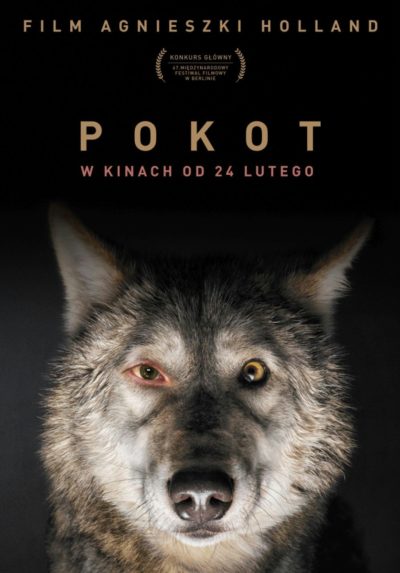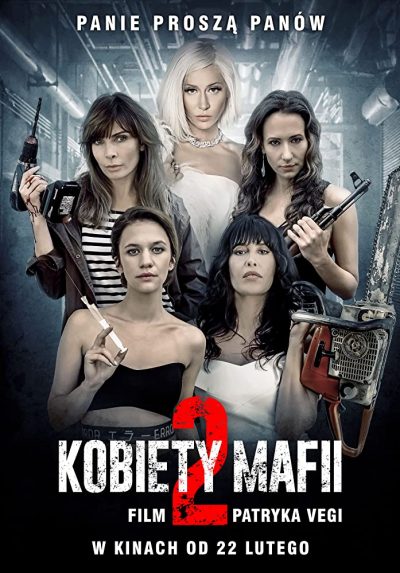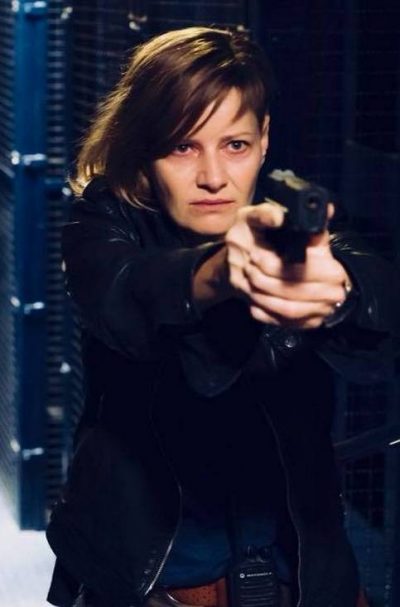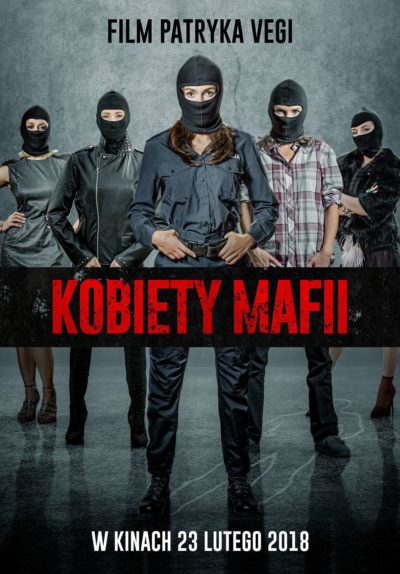★★★½
“Everybody has issues.”
 I’d be the first to admit, those issues likely extend beyond the characters in the movie, and probably extend to the script writers, because there are certainly… well, let’s just say, some novel concepts here. The heroine is Nina Nowak (Grochowska), a former Special Ops soldier, who had to fake her own death and give her son Maks up to adoption, for both their security. She’s been keeping an eye on Maks (Delikta) from afar, but after he’s abducted at the request of a gangster Nina took down, she needs to become considerably more hands-on. Rescuing Maks, however, will bring her into contact with a number of rather odd people, on both sides of the law.
I’d be the first to admit, those issues likely extend beyond the characters in the movie, and probably extend to the script writers, because there are certainly… well, let’s just say, some novel concepts here. The heroine is Nina Nowak (Grochowska), a former Special Ops soldier, who had to fake her own death and give her son Maks up to adoption, for both their security. She’s been keeping an eye on Maks (Delikta) from afar, but after he’s abducted at the request of a gangster Nina took down, she needs to become considerably more hands-on. Rescuing Maks, however, will bring her into contact with a number of rather odd people, on both sides of the law.
In particular, there’s Igor (Delikta), her contact inside the establishment, who is divorced, and has a fragile relationship with his daughter that he desperately wants to repair. On the other side is the very strange Woltomierz (Wróblewski), a gangster who keeps the severed head of his father in a jar on his mantelpiece, and is known as “Volto” for his habit of tazing incompetent henchmen to death. Getting, and keeping, Maks out of his grasp is going to be a challenge for Nina. Although her bad-ass credentials are firmly established after she takes on a group of men outside a convenience store, armed with nothing more lethal than a six-pack of beer. Nina literally knocks one of them out of his shoes.
This is not to be confused with any of the other similarly titled films, not least the 2010 movie starring Rebecca de Mornay. Nor should it be confused with another recently released Netflix movie about a mother with special skills, looking for her abducted child, The Mother, starring Jennifer Lopez. With that said, the look and feel of this is impressive, the fight scenes in particular being well-staged and imaginative – though fair warning, do not expect realism. or anything approaching it. I’m unaware of Grochowska having any particular action background, yet she still delivers on that front. Most notably, she stabs someone in the head with a pair of carrots: I’ve not seen that since the equally bonkers Clive Owen movie, Shoot ‘Em Up.
The whole film is lit in a sickly green palette, which does a great job of making the city in which it takes place, look like a terrible place to live. Less successful are the attempts at drama. The Nina/Maks relationship is flat and unconvincing, and the rest of the cast largely seem to be weird for weirdness’s sake. They’re not as interesting as the makers think they are. The best way to look at this is perhaps as a female-fronted version of Crank: a deliberately excessive action flick, clearly not intended to be taken seriously. As such, I think it is a better effort than Jolt, another Netflix movie which seemed to be aiming along similar lines. The ending hints at a sequel and, truth be told, I wouldn’t mind one.
Dir: Mateusz Rakowicz
Star: Agnieszka Grochowska, Adrian Delikta, Dariusz Chojnacki, Szymon Wróblewski





 Football is known as “The beautiful game,” but you wouldn’t know it based on this documentary, which seems perversely intended to remove anything like that from its topic. It focuses on
Football is known as “The beautiful game,” but you wouldn’t know it based on this documentary, which seems perversely intended to remove anything like that from its topic. It focuses on  Janina Duszejko (Mandat) is a former engineer, who now lives in a small rural Polish town. She has a deep love of nature and animals. This is a belief not shared by many of the local population, who treat animals as a resource, put there for their benefit – an attitude which brings them into conflict with Duszejko. After her two dogs disappear, she goes to the authorities, but they blow her off. However, the man she suspects most, turns up dead – just the first in a series of mysterious deaths, that may be related to Jaroslav Wnetzak, a local businessman with a finger in a number of shady pies. Subsequent corpses include the police chief, who owes Wnetzak money.
Janina Duszejko (Mandat) is a former engineer, who now lives in a small rural Polish town. She has a deep love of nature and animals. This is a belief not shared by many of the local population, who treat animals as a resource, put there for their benefit – an attitude which brings them into conflict with Duszejko. After her two dogs disappear, she goes to the authorities, but they blow her off. However, the man she suspects most, turns up dead – just the first in a series of mysterious deaths, that may be related to Jaroslav Wnetzak, a local businessman with a finger in a number of shady pies. Subsequent corpses include the police chief, who owes Wnetzak money. I was enormously surprised to see this one pop up on Netflix – it’s not as if the
I was enormously surprised to see this one pop up on Netflix – it’s not as if the 
 The above is the Polish for “seven”, and in the first half-hour, you’ll be forgiven for thinking that’s what you’re watching: a Polish knock-off of David Fincher’s Se7en. Homicide cop Helena Rus (Kożuchowska) is struggling to come to terms with life, after her boyfriend is killed by a drunk-driver and, for political reasons, the criminal is allowed to go free. A welcome distraction comes in the shape of a series of ritualistic murders: every day at 6 pm, a body turns up on the streets of Wroclaw. The victims have been killed in strange and unusual ways – the first, for example, is sewn inside a cow-hide, which shrinks as it dries, crushing the victim to death. Each has a word branded into their flesh, such as “Degenerate”.
The above is the Polish for “seven”, and in the first half-hour, you’ll be forgiven for thinking that’s what you’re watching: a Polish knock-off of David Fincher’s Se7en. Homicide cop Helena Rus (Kożuchowska) is struggling to come to terms with life, after her boyfriend is killed by a drunk-driver and, for political reasons, the criminal is allowed to go free. A welcome distraction comes in the shape of a series of ritualistic murders: every day at 6 pm, a body turns up on the streets of Wroclaw. The victims have been killed in strange and unusual ways – the first, for example, is sewn inside a cow-hide, which shrinks as it dries, crushing the victim to death. Each has a word branded into their flesh, such as “Degenerate”. Having enjoyed the same director’s
Having enjoyed the same director’s  This is new territory for me, being the first Polish film to qualify here. Turns out, director Vega has, largely single-handedly, driven a bit of a new wave of cinema from that country. Rather than the lugubrious dramas of Krzysztof Kieślowski, Vega is more like Guy Ritchie, making violent gangster flicks. In this case, the script came with direct input from the gangsters themselves, one of whom contacted Vega after being annoyed by their portrayal in a previous movie. Probably wisely, he opted to take their criticisms on board here…
This is new territory for me, being the first Polish film to qualify here. Turns out, director Vega has, largely single-handedly, driven a bit of a new wave of cinema from that country. Rather than the lugubrious dramas of Krzysztof Kieślowski, Vega is more like Guy Ritchie, making violent gangster flicks. In this case, the script came with direct input from the gangsters themselves, one of whom contacted Vega after being annoyed by their portrayal in a previous movie. Probably wisely, he opted to take their criticisms on board here…